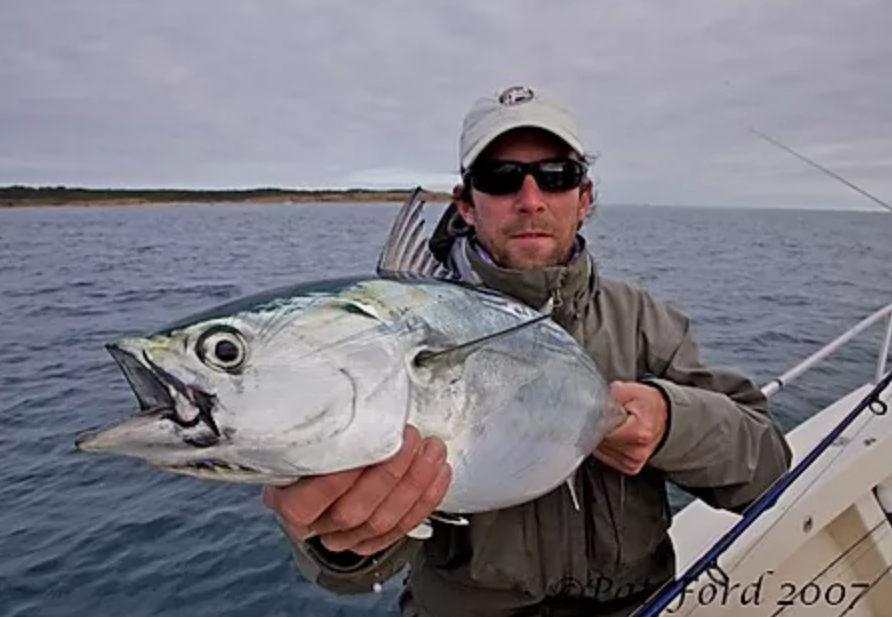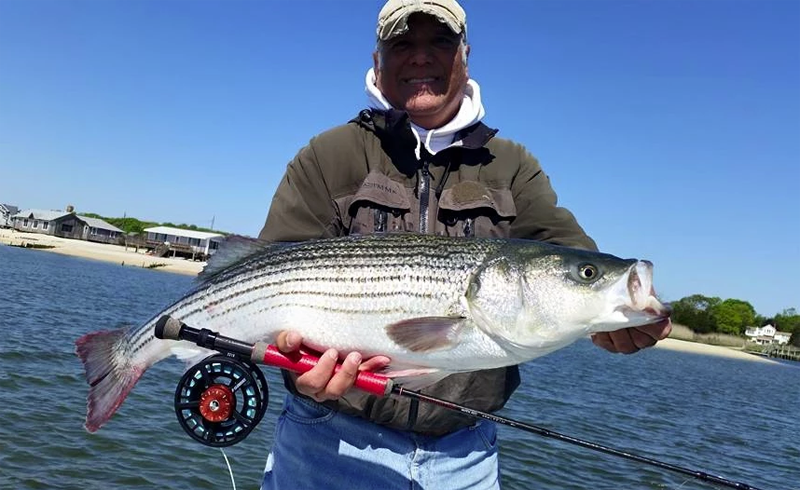
Capt. Andrew Derr with a nice albie off the coast of Montauk 2007. Photo Pat Ford.
Recently, an old friend visited me, Bill Corleone [Willy]; that’s his real name, and he is from Brooklyn, NY, and his father is from Sicily. We dared a COVID 19 lunch, and I chose a popular Atlanta cafe because Willy and I do lunch hours, not an hour, and enjoy good beef and sweets.
Another reason for the restaurant choice was that Brian Longacre, another old friend, had turned a so-so place into the happening place with the best grillin’ in Atlanta. He’s also an undeclared chef and can make anything taste better than it usually would. Check out Uncle Jack’s – a Happenin’ Place.
Seated, Bill and I began lamenting that the fly fishing world we live in was becoming depleted of its outstanding inventory of writers, Jim Harrison, for example. And Thomas Francis McGuane is kissing octoginta and even regional writers with a flair for good angling paragraphs right behind in their 70s, like Steve Kantner of South Florida. Willy and I, of course, had more names on the list.
After losing time laughing about some of our boyhood ‘blues’ fishing experiences on quiet Long Island Sound Beaches and sinking self repaired junkyard skiffs, we moved back to magazines again and writers.
At the top of our list for those to move into vacated roles were Tom Pero [Wild River Press] and William Sisson. There are more on that list, but Brian interrupted and suggested Fudge Brownie Soufflé, which we split.
Here is a sample of Sisson’s penned words, and a perfect storyline for fall: beaches and blues:

Flats striper. Capt. Andrew Derr photo.
“Season of the Surf”
By William Sisson / October 4, 2016 / Anglers Journal
The fall migration lures legions of diehards into the suds, where they cast night and day for one last fish
It’s late October, and a southeast gale is tearing up the Atlantic seaboard. The lighthouse looks like an old clipper ship rounding Cape Horn in a big blow, and the dozen anglers dressed in waders and rain gear are the waterlogged sailors working the deck.
I take a spot along the picket line closest to the point. The gusts are strong enough to buckle your knees. Spray pelts me, and every now and then a wave races up the rip-rap wall and threatens to sweep the legs out from beneath all the men in the row. You see a big one coming and brace for the impact.
“You got to be f**king crazy,” says a guy to my right as sheets of rain join the wind. “You got to really love it.”
Thick, gray swells roll out of the rain and mist. When they hit the reef, they transform into towering 12-foot wedges with white tops and flat-colored faces. Some roll down the channel to the northwest, but others reflect off the shallows and swarm the point like a furious mob. Huge plumes of water shoot skyward as if a small depth charge has been detonated. High tide is still more than an hour away, and one fisherman predicts the northwest corner of the seawall will be demolished by the time the storm is over. I doubt it, but you can see how the lashing gale could give that impression.
The storm is exhilarating, and the bluefish feeding off the north side of the light are as happy as clams. I fish a heavy tin squid on an old 12-foot Lamiglas surf rod, and when I set up on a big blue it’s as if I’ve hooked a small undersea tempest spun off from the maelstrom above.
A striped bass is led into the shallows.
Ties That Bind
Surf fishing binds you to the landscape. I sit on a beach log in early October and listen to a conversation that the southwest breeze is having with the young flood. The small swells answer and the terns carry the tune a little further with their dips and dives and cries. It is nearing 5 p.m., and things are looking fishy.
The fall light is special. It has a tangible quality that you can touch and feel. A bass or false albacore never looks more golden or green or black or silvery than when dripping wet, gleaming with this light.
A windy glow sweeps over the bluffs, beach grass and surf, and your small corner of the world catches its breath and comes alive. It’s as if you whispered abracadabra. All the players, from the breeze and tide to predators and prey, are held together like atoms in a chemical bond — there may be no way to break it, nor any reason to.
Some years, fall comes slowly.

